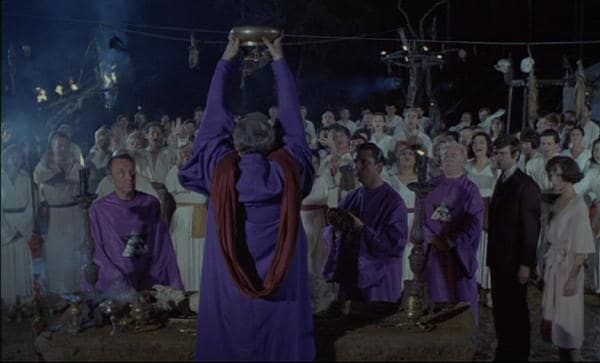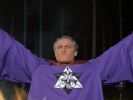Eye For Film >> Movies >> The Devil Rides Out (1968) Film Review
The Devil Rides Out
Reviewed by: Jennie Kermode

Few people could write about the occult like Dennis Wheatley, probably because he believed in it and studied it extensively. His work provided Hammer Studios with some of their strongest material, and The Devil Rides Out, in particular, makes quite an impression. It may have some structural weaknesses and require considerable suspension of disbelief, but it's strong on atmosphere and it features some knockout performances.
Chief among these is Hammer stalwart Christopher Lee as the Duc de Richleau, one of those aging aristocrats whose presumed education is so expensive and wide-ranging that he can credibly be credited with any amount of obscure knowledge. One pleasant Spring evening, he and his friend Rex (Leon Greene) set out to visit a younger friend, Simon (Patrick Mower) whom they both agree they haven't seen in far too long. As soon as they arrive, finding the place occupied by wary strangers, the Duc suspects that something is amiss. Rex doesn't (suspecting is not Rex's forté. Neither is thinking in general, really. In fact, he fails to think so often that the film might easily be retitled Rex Screws Up). But why is everybody anxious to get rid of them before midnight? Why does beautiful and mysterious guest Tanith deny her previous acquaintance with Rex? And why can the clucking of poultry be heard coming from a cupboard in the observatory?

As the initial mystery is solved, things go from bad to worse. Rex's solution to problems is to hit things, throw things, or drive cars really fast (fans of vintage cars will get a real treat in this film), but it soon becomes clear that this won't be enough against the forces of the Devil himself. If Simon and Tanith are to be saved before their souls are lost forever, our heroes must mount a direct challenge to sinister cult leader Mr Mocata (Charles Gray) - and all his sinister entourage, human and otherwise.
What you get out out a film like this depends on what you put into it. It would be quite possible to draw on its camp elements and laugh all the way through. Rocky Horror fans, for instance, may have trouble taking Gray's character seriously, for all his well judged, suavely sinister performance. Fans of Yes, Minister may find it peculiar watching Paul Eddington go into a little huff about the silliness of standing inside a magic circle all night. But to approach The Devil Rides Out in this way is to do yourself a disservice. If you can hold back for just long enough to take it seriously, you'll find it swiftly gets under your skin. James Bernard's powerful score builds to a crescendo in the later scenes when Mocato's agents attack. It's a thrilling sequence that still has the power to send shivers down the spine, even in this more cynical age.
There's more to this for those with an interest in the subject. The magic the Duc uses isn't exactly pure in itself, for all its Christian reference points, and one might be left asking how much of himself he has sacrificed to protect his friends. Furthermore, though something seems to intervene in the climatic scene when a character is about to be sacrificed, it isn't clear that it's the Christian God. Although Wheatley's own spiritual politics were far more clear-cut, it's these ambiguities that give the film its real strength, helping to create a sense of otherness beyond the bounds of conventional religious mystique. It's edgier than its apparently conventional narrative suggests, and this may be part of the reason why, after so many years, it continues to be haunting.
Reviewed on: 27 Jun 2010

















